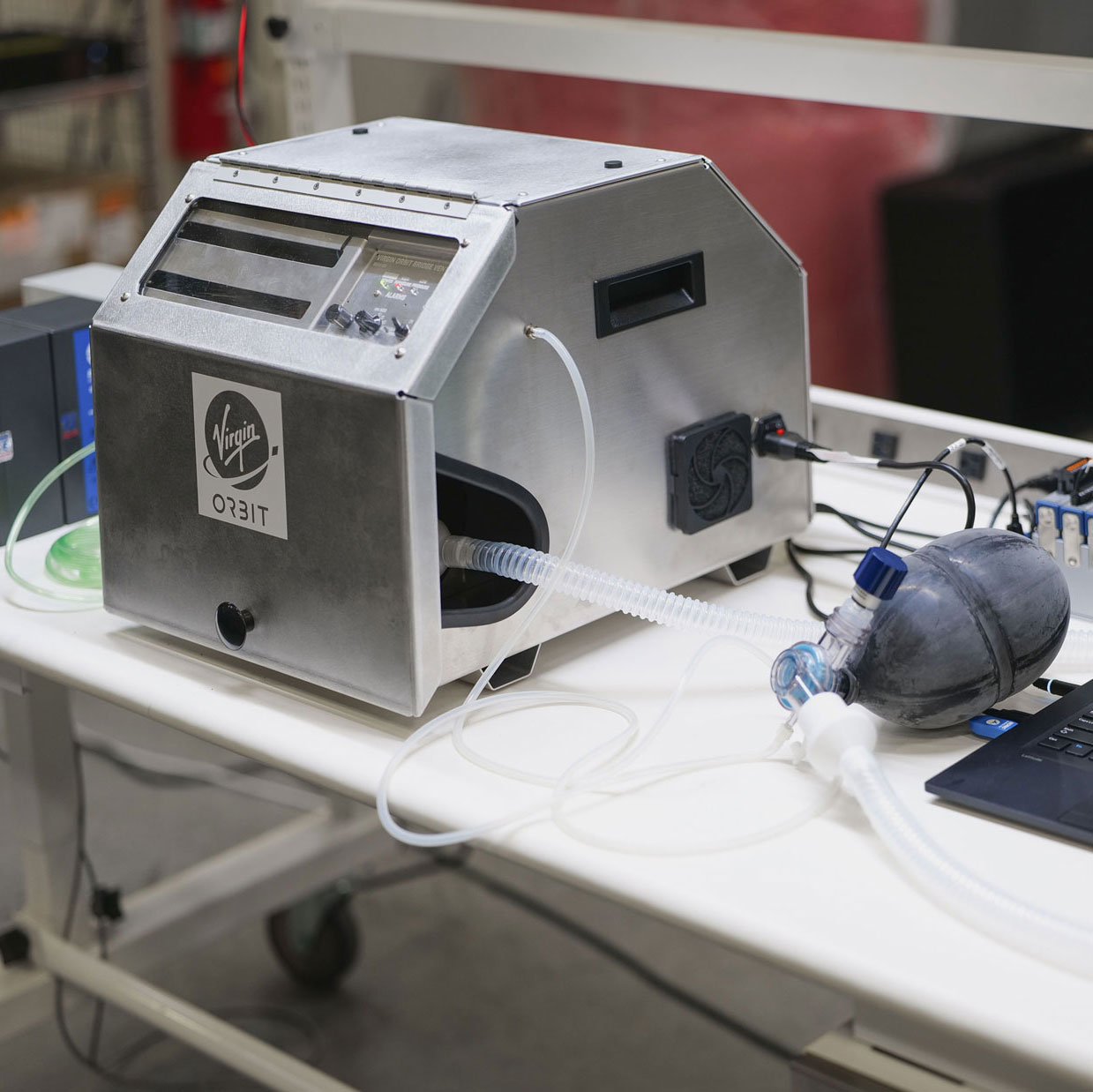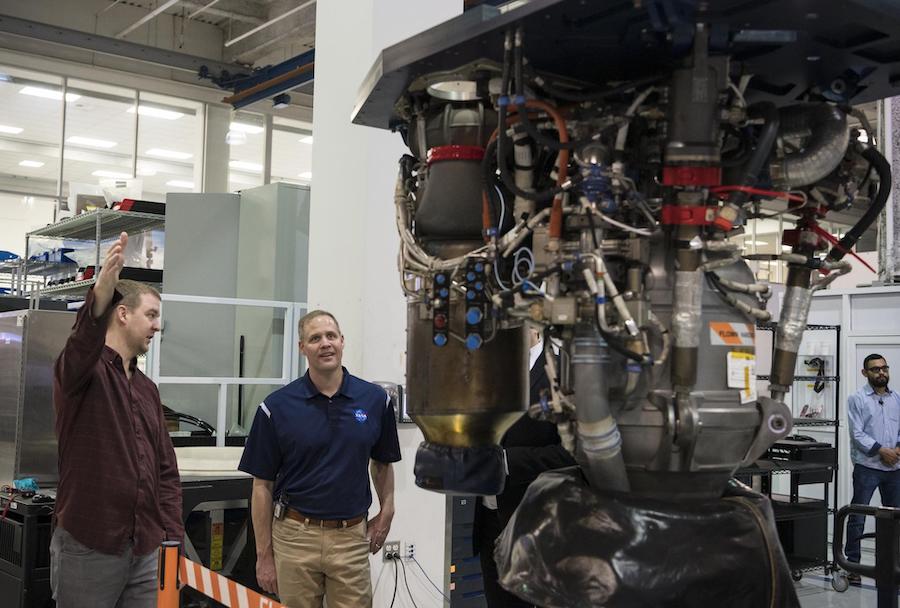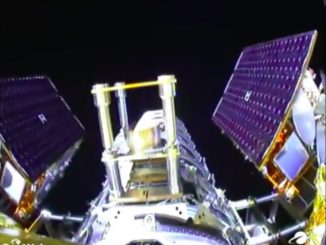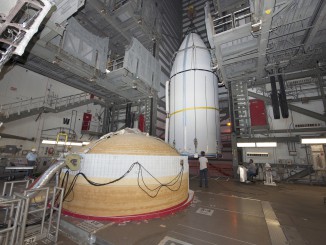
While production of rockets and satellites continues across much of the space industry amid the coronavirus pandemic, engineers at several space companies — including SpaceX, Virgin Orbit and Blue Origin — have started working on medical devices and protective equipment in response to shortages in hospitals across the United States.
Virgin Orbit has designed a simplified ventilator at its rocket factory in Long Beach, California, while SpaceX has agreed to supply valves for ventilators produced by the medical supply company Medtronic. The launch firm said it contacted California Gov. Gavin Newsom, whose office connected Virgin Orbit with the California Emergency Medical Services Authority.
California government officials put Virgin Orbit, backed by billionaire Richard Branson, with the Bridge Ventilator Consortium, a group led by doctors, engineers and scientists at the University of California Irvine and the University of Texas at Austin. The consortium was established to help set up production of simple, producible ventilators.
“Usually we’re working on rocket engines and launch systems that take satellites to orbit, but with the looming COVID-19 crisis, we reached out to Gov. Newsom and asked what can we do to help,” said Dan Hart, Virgin Orbit’s CEO. “We assigned some of our best innovators in engineering and manufacturability on the problem: How to make a ventilator quickly that can be produced in mass.”
In a YouTube video posted by Virgin Orbit, Kevin Zagorski, the company’s lead engineer on the ventilator project, said emphasis is on finding the “simplest, scalable and soonest available design.”
The ventilator designed by Zagorski’s team uses a windshield wiper motor to drive a machine that mechanically compresses a self-inflating bag, also called a manual resuscitator or Ambu bag.
“While it’s not difficult to make devices that can perform this mechanical compression of medical Ambu bags, what is difficult, and what is something that we at Virgin Orbit can bring to bear, is a very, very simple and robust design that we can get out to the people who are in the most need and the hospitals that are in the most need of devices like these very, very quickly,” Zagorski said.
Virgin Orbit says the simple device could be used in the treatment of moderate cases of the novel coronavirus, freeing up more expensive full-size ventilators for the most ill patients.
Simplicity is the crux of our ventilator design, making it easy to use in the hospital or field, and extremely fast and inexpensive to manufacture. With mass production, lots of patients with moderate symptoms can be treated, freeing up resources for others in more dire need. pic.twitter.com/YqgEJmHhv0
— Virgin Orbit (@Virgin_Orbit) March 31, 2020
Virgin Orbit announced the ventilator project March 30, and presented the preliminary design to Gov. Newsom on Friday.
On Monday, Virgin Orbit said it has submitted an application to regulators for Emergency Use Authorization for the ventilator.
“There’s more for us to do,” Hart said. “We have to work with the FDA (Food and Drug Administration) to get approval, but we hope to get a helpful unit into hospitals as soon as possible. We at Virgin Orbit want to do everything we can for the broader community as we all prepare for the challenges ahead.”
In a statement Monday, Virgin Orbit said testing and external evaluations of the ventilator indicate is is a “low-cost, easy-to-use, highly scalable device that can provide ventilatory support for the care of individuals who require mechanical ventilation.”
“Final production timelines will depend on the completion of testing and on our ongoing conversations with regulators, but we aspire to hit a production rate of 100 per week within a week or so, doubling that within a week, and then doubling again in the subsequent weeks,” Virgin Orbit said. “We intend to build them at a cost at least an order of magnitude lower than more sophisticated ventilators. Our effort has focused on immediate scalability, prioritizing speed over complexity.”
Virgin Orbit’s primary program is the development of the air-launched LauncherOne vehicle, a rocket designed to deliver small satellites to orbit. The first orbital test launch of the LauncherOne vehicle is expected later this year.
Meanwhile, SpaceX is partnering with Medtronic, a medial device firm, to help ramp up production of ventilators.
Omar Ishrak, Medtronic’s chairman and CEO, said Saturday that SpaceX is supplying an “important valve that will help us scale production sooner.”
“SpaceX is now making a vital component for critical care ventilators — more vents sooner for COVID-19 patients,” Medtronic tweeted.
Elon Musk, SpaceX’s founder and CEO, confirmed Medtronic’s statements on Twitter: “SpaceX is spooling up to manufacture proportional solenoid valves for Medtronic.”

SpaceX has also produced hand sanitizer facial shields for donation to hospitals and other businesses, according to CNBC. The company also donated protective suits to medical personnel.
Tesla, another of Elon Musk’s companies, is working on its own ventilator design using car parts. Tesla showcased a prototype of the ventilator in a YouTube video Monday.
United Launch Alliance’s chief executive is also helping out in the coronavirus crisis. Tory Bruno, ULA’s president and CEO, tweeted a video of his home 3D printers producing ventilator manifolds and face shields.
Bruno said he is using files generated by Makers Unite, a group set up to encourage people with their own 3D printers to use their resources to supply critical medical equipment.
3D printers running at the Bruno Ranch (home) making ventilator manifolds and face shields. pic.twitter.com/yK7sMU1aZF
— Tory Bruno (@torybruno) April 2, 2020
Blue Origin, the space company founded by Amazon billionaire Jeff Bezos, said Tuesday it is also 3D-printing face shields components to help combat the COVID-19 crisis.
“Our additive machines are working 24/7, and the volunteers for this effort also support BE-4 engine development,” Blue Origin said. “We are grateful for their dedication.”
Lockheed Martin said Friday it hired around 1,000 new employees in the second half of March as the coronavirus pandemic virtually shut down other sectors of the U.S. economy. The aerospace contractor, which builds airplanes, satellite and other defense equipment, said it is providing $106 million in accelerated payments to small businesses and other firms in the company’s supply chain.
Lockheed Martin said it is paying workers a bonus of up to $500 if they are regularly required to work at a Lockheed Martin or customer facility during the crisis, and the company is donating $2 million worth of personal protective equipment. The company said it has also initiated “limited” production of personal protective equipment and face shields, and is providing engineering support for initiatives to accelerate PPE production.
Arianespace, the French launch services provider, has donated ponchos to protect medical personnel working in hospitals in Europe.
Ravis que quelques ponchos soient si utiles aux soignants, que nous remercions très sincèrement pour ce qu’ils font. https://t.co/34HYHtLHgu
— Arianespace (@Arianespace) April 2, 2020
Space companies are working on the medical equipment — and continuing regular manufacturing and launch operations — even as some of their employees test positive for the coronavirus.
ULA said Monday that an employee at one of the company’s Denver facilities tested positive for COVID-19.
“We are taking all necessary precautions to protect the health and safety of our teammates and facilities,” Bruno said in a statement. “Our best wishes are with this person as well as teammates and family members affected by the diagnosis.”
ULA said it has close the floor of the building that was exposed to the virus and following stringent cleaning and disinfection protocols.
“Our early and aggressive COVID mitigations have limited the number of personnel exposed,” Bruno said. “We are executing our prepared and rehearsed response plan and anticipate no impacts to our manifest. ULA continues to proactively take steps to protect our people, slow the spread of the virus, and maintain national security.”
CNBC reported that six SpaceX employees have tested positive for the coronavirus as of Monday, citing an internal company memo. Three workers at Blue Origin’s headquarters in Kent, Washington, have also tested positive for COVID-19, according to GeekWire.
While they are taking measures to minimize workforce levels and engage in social distancing, large U.S. space companies like SpaceX, ULA and Blue Origin are continuing operations during the coronavirus pandemic. The U.S. Defense Department issued a memo last month stating that aerospace, mechanical and software engineers — among other personnel — working for defenses contractors and subcontractors should continue working.
The U.S. government has defined the defense industrial base and the critical manufacturing sector to include aerospace companies, which have an exemption to continue working even in states and municipalities with stay-at-home orders.
Email the author.
Follow Stephen Clark on Twitter: @StephenClark1.



